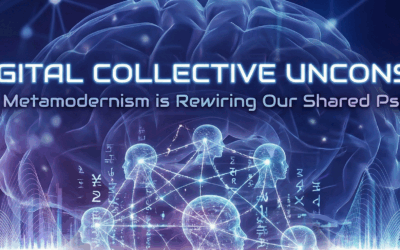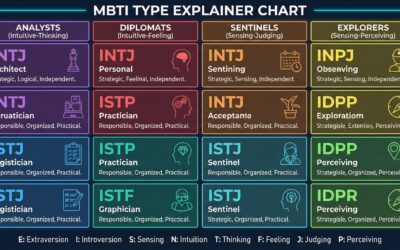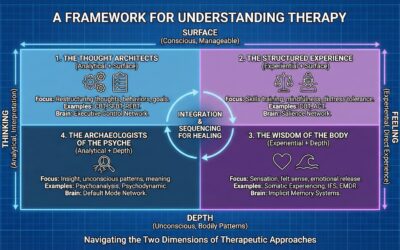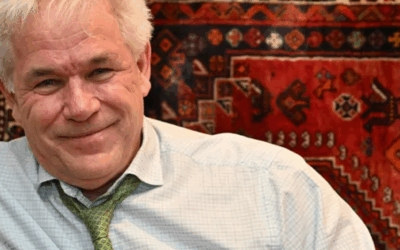Implications Theodore Porter’s Thinking in Psychotherapy and Mental Health

Who is Theodore Porter?
Porter’s Ideas Compared to Other Critics of Rationalizism and Empericism
Theodore Porter’s critique of quantification and objectivity has intriguing parallels and contrasts with the ideas of several other prominent thinkers who have examined the impact of technology, media, and bureaucracy on modern society.
Adam Curtis and the Critique of Computer-Based Societal Modeling
British documentary filmmaker Adam Curtis has argued that the increasing use of computers and data analysis in the late 20th century gave rise to a misguided belief that society could be perfectly understood and modeled using mathematical and computational methods. In his 2011 series “All Watched Over by Machines of Loving Grace,” Curtis suggests that this “cybernetic” view of the world, promoted by thinkers like Ayn Rand and Alan Greenspan, led to a misplaced faith in the power of markets and technology to solve social problems.
Porter’s work resonates with Curtis’s critique in its skepticism towards the assumption that quantitative methods can provide a fully objective and comprehensive understanding of complex human realities. Both thinkers highlight the ways in which the appeal of numbers and data can obscure the subjective judgments and political interests that shape their application.
However, while Curtis emphasizes the role of computers and cybernetics in promoting a mechanistic view of society, Porter’s analysis focuses more on the institutional and professional contexts that drive the pursuit of quantification. Porter’s distinction between mechanical and disciplinary objectivity suggests that the rise of numerical methods cannot be attributed solely to technological developments, but also reflects the social and political imperatives of bureaucracies and expert communities.
Jean Baudrillard and the Simulacra
The French philosopher and cultural theorist Jean Baudrillard is known for his concept of “simulacra” – representations that have become detached from reality and taken on a life of their own. In his book “Simulacra and Simulation” (1981), Baudrillard argues that in the postmodern era, signs and images have lost their connection to real-world referents, creating a hyperreal world where simulation is more powerful than reality.
Baudrillard’s ideas have intriguing implications for Porter’s critique of quantification. From a Baudrillardian perspective, the proliferation of numerical indicators and statistical models could be seen as a form of simulacra – abstract representations that have become more “real” than the complex social phenomena they purport to describe. The use of quantitative measures in fields like economics, policy, and mental health could be seen as creating a hyperreal world where decisions are based on simplified numerical proxies rather than direct engagement with human realities.
However, while Baudrillard’s work often emphasizes the seductive power of simulation and the impossibility of accessing the “real,” Porter’s analysis suggests that quantification is always shaped by social and political contexts. Rather than seeing numbers as fully detached from reality, Porter emphasizes the ways in which quantitative methods are embedded in networks of expertise, accountability, and trust.
The Situationists and the Spectacle of Quantification
The Situationist International was a group of radical artists and theorists active in the 1950s and 60s, known for their critique of consumer capitalism and their advocacy of revolutionary social change. One of the key concepts developed by the Situationists was the idea of the “spectacle” – a term used to describe the way in which modern media and advertising create a false, alienated representation of reality that distracts from authentic human experience.
The Situationist critique of the spectacle has some intriguing parallels with Porter’s analysis of quantification. Just as the spectacle reduces human life to a series of commodified images, the proliferation of numerical indicators and statistical models could be seen as creating a kind of “spectacle of objectivity” – a seductive but ultimately alienating representation of social reality.
However, while the Situationists emphasized the need for radical social and political transformation to overcome the spectacle, Porter’s work suggests that the pursuit of quantification is deeply embedded in the structures and practices of modern institutions. Rather than advocating for a complete rejection of numerical methods, Porter’s analysis invites a more nuanced consideration of how quantitative tools can be used in ways that are transparent, accountable, and responsive to human contexts.
Nietzsche and the Rational
One important point of comparison is with the work of Friedrich Nietzsche, whose genealogical approach to the history of ideas shares with Porter a skepticism towards claims of pure objectivity. Nietzsche’s critique of scientific rationality as a form of asceticism and self-denial, driven by a “will to truth” that serves particular interests and values, anticipates Porter’s examination of the moral and political dimensions of quantification. Like Porter, Nietzsche emphasizes the historical and psychological contingency of knowledge practices, revealing the ways in which the pursuit of truth is always entangled with questions of power and desire.
However, Nietzsche’s critique is arguably more radical and far-reaching than Porter’s, calling into question the very value of objectivity and suggesting that all knowledge claims are ultimately expressions of a will to power. While Porter’s analysis is more focused on the specific contexts and practices of quantification, Nietzsche’s genealogical method aims to uncover the deeper moral and metaphysical roots of scientific thinking itself.
Michel Foucault and the Social Objective
Another key thinker whose work intersects with Porter’s is Michel Foucault, particularly in his analyses of the relationship between knowledge and power. Foucault’s concept of the “power/knowledge nexus” emphasizes the ways in which the production of knowledge is always intertwined with networks of power relations, shaping the possibilities for thought and action in a given historical moment. This perspective resonates with Porter’s examination of how quantitative methods have been employed in the service of bureaucratic administration and governance, from public health and education to criminal justice and social welfare.
Like Porter, Foucault is attentive to the role of quantification in the management of populations and the disciplining of individual subjectivities. He shows how statistical norms and standards, presented as objective and neutral, can function as instruments of power, shaping the ways in which people understand and govern themselves. At the same time, Foucault’s work encompasses a broader range of knowledge practices and power relations than Porter’s more specific focus on quantification, and his emphasis on the ontological and political effects of knowledge production differs from Porter’s more epistemological and professional concerns.
Michel Foucalt
Legacy of Porter’s Ideas
Theodore Porter’s critique of quantification offers a valuable perspective for examining the use of numerical methods in psychotherapy and mental health. His work challenges the assumption that quantification is inherently objective and neutral, highlighting the social, political, and institutional factors that shape the application of statistics and standardized procedures.
In the context of psychotherapy, Porter’s ideas invite a critical reflection on the evidence-based practice movement, diagnostic systems, and the therapeutic relationship. While quantitative methods can provide important insights and support accountability, an overreliance on these approaches can also constrain the understanding and treatment of psychological distress.
As the mental health field grapples with the challenges of providing effective, equitable, and humane care, engaging with Porter’s work can inform the development of more nuanced and contextually-sensitive approaches. This may involve balancing the use of standardized interventions with the cultivation of clinical judgment, attending to the social and cultural determinants of mental health, and prioritizing the therapeutic alliance as a key factor in outcomes.
Ultimately, a critical understanding of the role of quantification in psychotherapy can support the delivery of care that is both evidence-based and person-centered, and that honors the complexity and diversity of human experience.
References:
Porter, T. M. (1995). Trust in Numbers: The Pursuit of Objectivity in Science and Public Life. Princeton, NJ: Princeton University Press.
Porter, T. M. (1986). The Rise of Statistical Thinking, 1820-1900. Princeton, NJ: Princeton University Press.
Porter, T. M. (2008). Thin description: Surface and depth in science and science studies. Osiris, 27-32.
Eriksen, K., & Kress, V. E. (2008). A developmental, constructivist model for ethical assessment. Journal of Humanistic Counseling, Education and Development, 47(2), 202-216.
Chambless, D. L., & Hollon, S. D. (1998). Defining empirically supported therapies. Journal of Consulting and Clinical Psychology, 66(1), 7.
Norcross, J. C., & Wampold, B. E. (2011). Evidence-based therapy relationships: Research conclusions and clinical practices. Psychotherapy, 48(1), 98.
Cosgrove, L., & Wheeler, E. E. (2013). Industry’s colonization of psychiatry: Ethical and practical implications of financial conflicts of interest in the DSM-5. Feminism & Psychology, 23(1), 93-106.
Prilleltensky, I. (2008). The role of power in wellness, oppression, and liberation: The promise of psychopolitical validity. Journal of Community Psychology, 36(2), 116-136.


























0 Comments